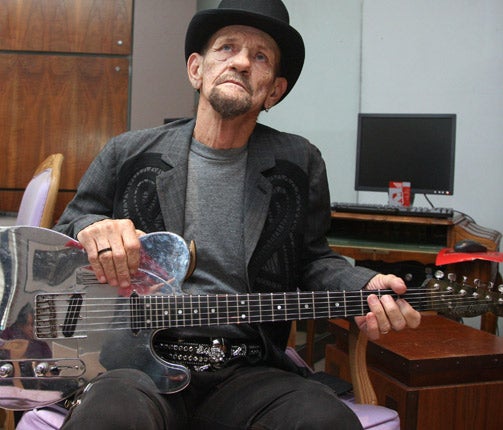Calvin Russell: Texan rocker who found belated success in continental Europe

Once heard, usually on one of the BBC radio programmes presented by Bob Harris, Calvin Russell's gravelly voice, his tales of love and loss and his protest songs, stayed with you. An ex-convict and one-time associate of Townes Van Zandt, a Texan singer-songwriter he had much in common with, Russell never rose above cult status in the US or the UK, but found success throughout continental Europe in the 1990s. Already 40 when he signed to the French independent label New Rose in 1989, he seemed determined to make up for lost time, releasing 15 albums in 20 years, and maintaining a busy touring schedule. Last seen in Europe in November 2009, he still wore one of his trademark cowboy hats cut around the brim that made him look like an undertaker straight out of a Lucky Luke cartoon, but he was the real outlaw deal.
Calvert Russell Kosler was the fourth of nine children born to a short-order cook and a waitress at the Sho'Nuff Café in Austin, Texas. His parents struggled to make ends meet and the family often did a midnight flit when they fell behind with the rent. He was a troubled teenager, keener to listen to Elvis Presley and Chuck Berry and imitate his elder sister's guitar-playing boyfriend than to study. In the early 1960s he formed The Cavemen and began playing the Chicago and Delta blues he heard Wolfman Jack play on the radio.
At the age of 15 he ran away to San Francisco but soon drifted back to his native state, where he sold marijuana and LSD. In 1968, he was arrested after trying to use someone else's credit card while high on drugs and sent to the Texas State Penitentiary at Huntsville. "I didn't think I was going to make it," he said. "The guards were a sorry, sadistic bunch and they'd look for any excuse to whale on you."
Encouraged by a cellmate with the colourful name Shotgun McAdams, he began writing poems and songs. However, he spent the next 15 years in and out of jail for small-time drug dealing, including 18 months in a Mexican prison. Back in Austin, he fell in with Van Zandt, another reprobate and a gifted songwriter: "He had this magical use of words. I remember he played 'Pancho and Lefty', that's when I realised just what a song could do. I shut up around Townes and listened. All my intelligence just went right to him."
Now calling himself Calvin Russell, since no one ever seemed to be able to say or spell Calvert, he honed his songwriting skills and recorded a tape containing 22 of his compositions. He intended to present the cassette to Charlie Sexton, a Texan guitar prodigy with a hit album who he heard was paying a return visit to Austin. Instead, he gave it to Patrick Mathé, the co-founder of the New Rose label, who had complimented him on his singing and guitar-playing at a party they both attended at Austin's Continent Club. "I took the tape out of my pocket, like a cowboy drawing a pistol in a Western. Patrick said, 'I want to put a record out,' and I thought, well, Warner Brothers ain't knocking my door down, so, yeah, go ahead. I didn't expect anything to happen."
Russell joined New Rose's roster of garage and psychedelic rock legends – Alex Chilton, Sky Saxon, Roky Erickson, Arthur Lee – as well as British and French alternative artists, and became one of its best acts. His critically acclaimed 1990 debut, A Crack In Time, sold 100,000 copies, and he became a fixture on television and on the touring circuit throughout continental Europe, where his blend of blues, country and rock appealed to Hell's Angels as much as to fans of what was just starting to be called Americana.
Russell made the most of the redemptive opportunities that finally came his way. He recorded two albums produced by the legendary Jim Dickinson, Soldier in 1992 and Calvin Russell in 1997, the latter featuring the Green On Red guitarist Chuck Prophet and the Muscle Shoals session stalwarts David Hood on bass and Roger Hawkins on drums. In 1993, he played 178 concerts in Europe, as documented on the Le Voyageur live album. In 1994, he appeared in a TV commercial for Motorex Oil of Switzerland, performing the evocative "Crossroads", his best-known composition. After another drugs bust back in Texas in the mid-'90s, he lived in France, Amsterdam and Switzerland, and was put on probation when he eventually returned to the States with his fourth wife, Cynthia, a Swiss citizen who was 27 years his junior.
A rootsy singer-songwriter in the vein of JJ Cale, Steve Earle and Lucinda Williams, Russell was never a prophet in his own country. "I'm not easy to pigeonhole," he said. "I don't just play the blues, or rock or country music. And my life in the US is so wrapped up with all my past misdemeanours. I blew it there, that's all."
Despite undergoing a liver transplant last year, he died of liver cancer.
Pierre Perrone
Calvert Russell Kosler (Calvin Russell), singer, songwriter and guitarist: born Austin, Texas 1 November 1948; married four times (one son); died Garfield, Texas 3 April 2011.
Join our commenting forum
Join thought-provoking conversations, follow other Independent readers and see their replies
Comments